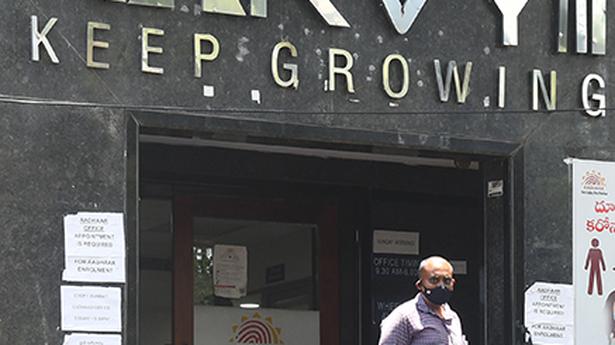
ED attaches assets worth ₹1,984 cr. in Karvy group case
The Hindu
The Enforcement Directorate (ED) has attached properties worth ₹1,984 crore in connection with the money laundering probe against Karvy Stock Broking Limited (KSBL), its chairman Comandur Parthasarathy and others.
The action is based on the First Information Reports (FIRs) registered by the Hyderabad police following complaints from the lending banks that the Karvy group had allegedly taken huge loans by pledging its clients’ shares worth about ₹2,800 crore. The loan accounts became non-performing assets after the release of the clients’ securities on the orders of the National Stock Exchange (NSE) and the Securities and Exchange Board of India (SEBI).
“The scam came to light after a limited purpose inspection of KSBL conducted by the NSE in 2019 revealed that KSBL had not revealed a DP (depository participant) account and credited the funds raised by pledging of client securities to six of its own bank accounts (‘stock broker-own account’) instead of the ‘stock broker-client account’,” said the agency.
During the investigation, the ED gathered details of the NSE audit and the orders passed by the SEBI and the Registrar Of Companies against KSBL, besides the forensic audit reports of BDO India LLP. On September 22, 2021, it conducted searches at nine locations. Subsequently, Mr. Parthasarathy and the group’s chief financial officer (CFO), G. Hari Krishna, were arrested in January. They are currently in judicial custody.
Mr. Parthasarathy did not cooperate in the probe and, while admitting a few wrongdoings on the KSBL’s part, shifted the entire blame on the chief executive officer, CFO and other senior management, according to the ED.
It is alleged that the KSBL misused the power of attorney given by its clients. Shares of the clients who did not owe any funds to the firm were transferred to its margin/pool account and pledged with the banks for loans. The firm’s sales team claimed that, for the share transfers, clients’ approval had been taken orally or via phone.
The loans were allegedly diverted to related entities such as KDMSL and KRIL. The money was routed through several defunct non-banking financial companies (NBFCs) to KFSL NBFC. A significant portion was also pumped into shell insurance companies that did massive speculative share trading with the KSBL and ostensibly suffered massive losses, as alleged.











